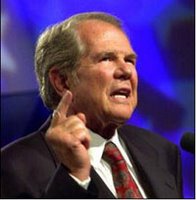 Last year I attended an academic conference on politics and religion. Speakers included respected professors and researchers from across the country. Feeling mentally dwarfed by all that brain power, I meekly raised my hand and asked, "Would you define and explain the differences between 'evangelical Christian' and 'mainline Christian'?"
Last year I attended an academic conference on politics and religion. Speakers included respected professors and researchers from across the country. Feeling mentally dwarfed by all that brain power, I meekly raised my hand and asked, "Would you define and explain the differences between 'evangelical Christian' and 'mainline Christian'?"The heming, hawing and waffling I received in response to my seemingly simplistic question clued me into a couple things: 1) No one wants to answer this question, because 2) the question's probably not as simplistic as I thought it was.
Aside from making a list of denominations that identify as mainline churches (United Methodist, Presbyterian, Evangelical Lutheran Church in America, Episcopal, American Baptist, United Church of Christ, and Disciples of Christ are the biggies), it's a challenge to define mainliners. That's because mainline churches aren't defined by a set of doctrines, but rather their moderate stance on doctrine.
For example, some members of these churches believe the Bible is literal and that the Holy Spirit directly provided words to its writers. Others view parts of the Bible as illustrations or analogies. Still others believe the Bible represents God but wasn't necessarily inspired by God. Some believe homosexuals should be allowed to serve as church leaders, some don't. Some believe Jesus is the only way to get to heaven, others think God may provide alternate means. The idea here is mainline members have theological latitude on these and other issues.
Once I figured out "mainline" meant an "attitude toward latitude" (polite laughter, please), it started to make sense why I received a rambling, evasive answer to my question. You see, when I posed my question at the conference, the two presenters I asked were both members of mainline churches. Their latitude allows them to accept a myriad of beliefs, including the evangelical stance. It's kind of hard to differentiate yourself from others when your concept is, "I'm right. You're right. We're all right."
Conversely, if an evangelical had been standing on that stage and heard my question, their answer might have been an immediate and direct, "We unwaveringly believe the following four points are certain, factual, God-given truth. The mainliners waffle on these points. That means they're wrong, wrong, wrong."
Now that I've poked fun at both sides, here are the four core beliefs of evangelicals. (There's ongoing debate about the definition of evangelicalism, but these points I lifted from Wikipedia well represent the concept.)
1) Biblical inerrancy.
2) Salvation comes only through faith in Jesus and not good works.
3) Individuals (above an age of accountability) must personally trust in Jesus Christ for salvation.
4) All Christians are commissioned to evangelize.
The problem with such definitions is they never seem quite complete. My friend Brooke feels evangelicals underemphasize the service aspect of Christianity, such as aiding the poor, sick, and hurting. Some scholars expand the definition of core belief #4 to activism, service, and social reform, but I know Brooke is right: Evangelicalism emphasizes evangelizing (telling people about Jesus) more than service.
I find problems with both mainline and evangelical thought, in both what they include and exclude. Yet rather than focusing on what's wrong with their approaches to Christian faith, I wanna give props for what's right.
Mainliners realize legalism hurts the church. Should we kick folks out of the church because they have a glass of wine with their dinner? Should we eject those who aren't Republican, who don't tithe 10 percent gross, who wear flashy clothes and jewelry, who don't attend church every Sunday? Mainline churches don't have a problem with any of this trivial stuff. They understand obedience to God is paramount, Jesus is our focus, and quibbling over small issues is generally a waste of time. Further, they recognize most "issues" are small. (More: Acts 10: Peter's visits with Cornelius; and 1 Corinthians 8: on eating food sacrificed to idols.)
Mainliners believe homosexuals belong in church. Regardless of how churches weigh in on same-sex marriage or gays as church leaders, I believe every church should have its doors open to the gay community. I'm not talking about an acceptance of gay lifestyle. I'm saying Christianity--and church--needs to be available to everyone: drug addicts and alcoholics, those who've had premarital and extramarital sex, women who've had abortions, men who struggle with pornography, pedophiles and murderers. (Truth is, all of these people are already in church.) We must reach out to them with love and forgiveness, just as Jesus reached out to prostitutes, criminals, and the lowest members of his society. (More: John 4:1-42: woman at the well; Luke 7:36-50: woman washes Jesus' feet; Luke 23:32-43: the two criminals.)
Mainliners recognize the God-given abilities of women--as do most evangelicals. Mainliners are particularly vocal about allowing women in church leadership. I've been blessed to attend evangelical churches where both women and men teach, preach, and lead worship.
Evangelicals know when to take a stand, and there's no compromise on salvation through Christ. In our tolerant society, it's a lot easier to say, "Well, maybe there are other ways to heaven." Many Christians will say this when
 backed into a corner, or because they don't want to offend someone. But this type of tolerance is actually a disservice to others. Say your friend's head is on fire. You're holding a fire extinguisher, but your friend says they don't think it will work. Instead, they're fixated on using a can of gasoline to douse the flames. The tolerant statement would be, "If it were me, I'd use this fire extinguisher. But since you don't want it, I guess that can of gasoline might work, too." If it was my head on fire, I'd hope my friend would tell me the truth.
backed into a corner, or because they don't want to offend someone. But this type of tolerance is actually a disservice to others. Say your friend's head is on fire. You're holding a fire extinguisher, but your friend says they don't think it will work. Instead, they're fixated on using a can of gasoline to douse the flames. The tolerant statement would be, "If it were me, I'd use this fire extinguisher. But since you don't want it, I guess that can of gasoline might work, too." If it was my head on fire, I'd hope my friend would tell me the truth.Evangelicals don't keep faith to themselves. A mainline friend once told me, "I feel no need to evangelize. I leave that up to God." Now, I know plenty of mainliners who love to evangelize, and I'm sure there are plenty of evangelicals who keep mum about their faith, so I'm not trying to characterize mainliners here. Rather, I'm praising evangelicals for making evangelism a core value. Peoples' heads are on fire, and we Christians--evangelicals and mainliners--are all holding a fire extinguisher. Personally, I think we need to be offering it constantly.
I've witnessed and participated in plenty of cat fights between Christians about abortion, same-sex marriage, alcohol, political parties, dancing, having church bingo night ... the list goes on and on. Most often the fights rage on, opinions stay the same, and nothing gets accomplished. Do I think we should drop all our opinions and be indifferent about everything? No way. The thoughts in our heads are there for a reason. God's given each of us the ability to think deeply and rationally.
Therefore, I do believe we should be looking for the rational side of every opinion, and giving props for what's right. It's my hope women might look for alternatives to abortion. It's also my hope churches will reach out to women who've had abortions.
Admittedly, it's hard to see beyond my own ideas. (Maybe it would be easier if I was one of those tolerant mainliners!) But I think God can use this exercise to humble me, and remind me I'm not always 100 percent right.
To ponder:
1) Is it difficult for you to see another person's point of view? If so, why? If not, what do you think makes it easy?
2) Do you often find yourself getting wimpy about your faith? What situations cause this?
3) Do you find yourself getting defensive about your faith, and/or losing your temper? What sets you off?
4) Consider your responses to #2 and #3. Imagine yourself in a situation where you're feeling pushed around, or getting angry. Try to think about words you could use, or actions that might make this easier to deal with. For example, my friends who are hostile toward Christianity often begin conversations with hostile remarks such as, "Christians are such judgmental jerks!" When I'm having a conversation with a good friend, I've learned to ask them a question that reminds them I'm a Christian, such as, "You know I'm a Christian. Do you feel I judge you?"
1 comment:
I enjoyed your latest post. I think you can tell from some of my recent emails to you, that although I am thoroughly a part of the evangelical tribe, I do not limit my theological thought and practice to the traditional evangelical “platform” alone. I think that there are an increasing number of evangelicals who are broadening their Christianity mainly in response to the times. To understand any Christian movement, one must look at the historical, cultural environment which produced such a movement. I think many evangelicals who are aware of what is happening in the world and of the post modern shift, are making attempts to re-define evangelicalism in ways that make sense today (as opposed to 1950’s American Middle Class). Here are some related materials you might find interesting:
Did you read the Billy Graham cover story in last week’s issue of Newsweek? It was a very interesting (and favorable) examination of Graham’s beliefs now as he prepares for his passing. It is obvious that Billy Graham has broadened his evangelicalism when it comes to issues of politics, view of scripture, other religions, and even salvation. If you missed the article, you can read it in its entirety here: http://www.msnbc.msn.com/id/14204483/
A book that I have yet to read, is The Post Evangelicals. I’m anxious to read it since it seems to address some the restlessness I feel when it comes to traditional evangelical thought. Here is a link to Zondervan’s page about the book: http://www.zondervan.com/Cultures/en-US/Product/ProductDetail.htm?ProdID=com.zondervan.9780310253853&QuerySiteString=Zondervan&QueryStringSite=Zondervan
Another book I want to read is The Younger Evangelicals by Robert Webber. Here is a link to a blog which has an interview with him about his book: http://www.theooze.com/articles/article.cfm?id=385
Speaking of Robert Webber, I enjoy his web-site because his main emphasis is on Christian worship. Since he is very in touch with cultural trends, his ideas about worship are quite interesting. I enjoy reading his newsletter archives. Here is the link: http://www.ancientfutureworship.com/
Renovaré is dedicated to spiritual formation through various Christian traditions. He is the link: http://www.renovare.org/
I hope are able to enjoy looking at some of these links!
Post a Comment